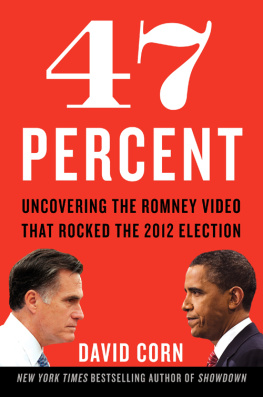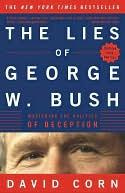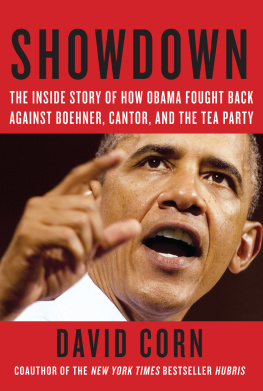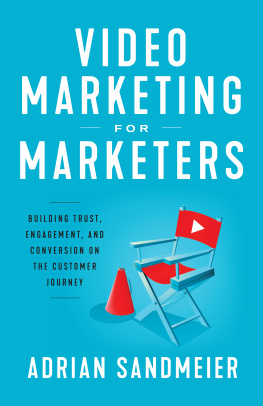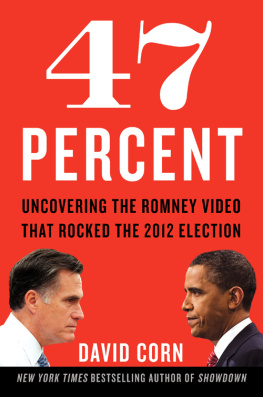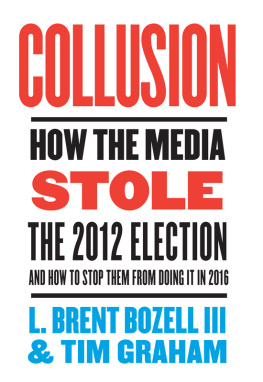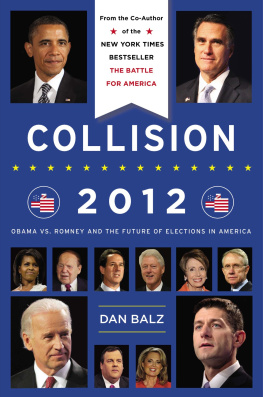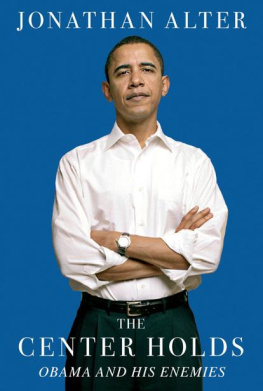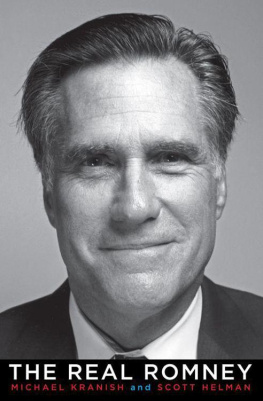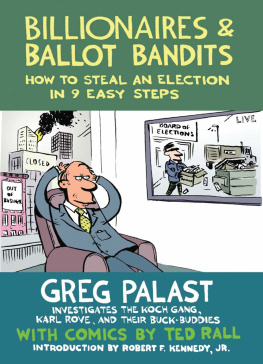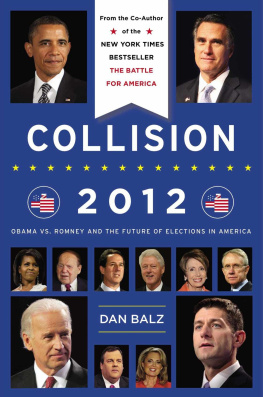47 Percent
Uncovering the Romney Video That Rocked the 2012 Election
D AVID C ORN

C ONTENTS
I T ALL BEGAN with the disposal of aborted fetuses.
That was what led to one of Mitt Romneys worst moments in the 2012 election and possibly his downfall as a presidential candidate: the revelation of a secretly recorded video at a private fundraiser that captured Romney denigrating 47 percent of the electorate as victims and moochers who rely upon government handouts, who do not pay income taxes, and, perhaps most insulting of all, who do not take personal responsibility and care for their lives.
This story, which generated headlines around the world, hit as Romney was slogging through the final stretch of a presidential contest that was not proceeding as Romney had once hoped it would. Instead of a referendum on President Barack Obamas handling of the sluggish economy, the election had become a choice between the two candidates and their respective visionsor perhaps a referendum on Romneys character.
I N LATE J UNE, three months before I revealed the 47 percent video on the Mother Jones website, I received an email from an investigator Ive known for years: Got a sec for a quick chat? My answer: Sure.
As a reporter, I receive tips and leads from a number of sources. Some have an obvious motive. (Say, a political campaign will point out something odd in the campaign disclosure filing of an opponent.) In most cases, the tipster is presenting me with material already in the public domainnot undercover video or a diary pilfered from someones home. The stuff simply has not been noticed. Usually the most important task at hand is determining whether the proffered material is factually correct and actually newsworthy.
This sourcewhom Ill call Lukeand I spoke that night, and he told me about a Bain Capital investment that could be bad news for Romney. Luke wasnt with the Obama reelection campaign or the White House, but he didnt say who his client was.
The deal was this: in late 1999, Bain Capitalthe private equity firm Romney had founded and managedand another private equity company had invested $75 million in Stericycle, a medical waste disposal firm that in more recent years has been attacked by anti-abortion groups for disposing of aborted fetuses collected from family planning clinics.
The Huffington Post earlier in the year had run an article reporting on this Bain investment. But when the HuffPo piece came out, Bain tamped down the potential controversy. The companys official line was that Romney left the firm in February 1999 to run the troubled 2002 Winter Olympics in Salt Lake City. That seemed to mean he had not been directly involved in the deal. Romneys connection to a firm that disposed of aborted fetusesindirect or notnever became a campaign issue.
Luke encouraged me to take another look, noting that my colleagues at the Washington bureau of Mother Jones and I had a reputation for digging and producing articles that went beyond the daily (and sometimes silly) give-and-take of political campaigns. He emailed me an electronic pile of documents, including news stories that chronicled Stericycles spotty safety record in its early years.
Included in the material were documents Bain had filed with the Securities and Exchange Commission. After I quickly confirmed that these SEC records were real, I read them and saw that Romney was listed as an active participant in the Stericycle investment, which occurred in November 1999. This fact was significant; it undercut the claim that Romney had departed Bain in early 1999 and had had nothing to do with the firms actions after that point.
The February cut-off date was important for Romney. The Washington Post , on June 21, 2012, had published a story reporting that Romneys Bain Capital had invested in a series of firms that specialized in relocating jobs done by American workers to new facilities in low-wage countries like China and India. With the presidential campaign focused on jobs creationhere in the United States, not abroadthis was a major slam on Romney: he had profited by outsourcing jobs.
His campaign pushed back hard, insisting that Romney had left from Bain before several of the key episodes cited in the Post article (though there was no denying Romney had retained a deep ownership stake in the private equity firm).
F OR WEEKS PRIOR to the Post piece, the Obama camp had been pounding on Romneys days at Bainfocusing on the firms acquisition of businesses that later underwent bankruptcies or job losses, even as Romney and his colleagues still reaped a profit. This was part of the Obama campaigns effort to portray the GOP presidential candidate as a 1 percenter who was out of touch with average Americans and, thus, not a politician who could be expected to advance policies that would boost the economic prospects of middle-class voters.
The goal for Obama and his reelection team based in Chicago was to define Romney for the general electionespecially for undecided voters who had not paid much attention during the Republican primariesbefore the multimillionaire former Massachusetts governor could do so himself. In April, David Axelrod, Obamas chief strategist, had told me that the campaign would move fiercely in the coming weeksduring the lull between the end of the GOP primary contest and the summer (when fewer voters would be following the campaign and, instead, be watching the Olympics)to influence how voters perceived Romney. With Romney touting his private sector experience as the top reason he should be hired as Americas CEO, bashing Romneys Bain record was critical for Obamas squad.
This was but one facet of the presidents grand strategy. Ever since the Democrats took a drubbing in the 2010 congressional elections, the president had been attempting to cast the 2012 election not as an up-or-down vote on his management of the economy, but as a fundamental clash between his vision of progressive government (which invests in education, innovation, and infrastructure to enhance the economy; which protects and strengthens the social safety net; and which pursues a deficit reduction strategy that includes a bit more taxes from the well-to-do) and the stark vision of the Tea Party-ized Republicans (who contend that government is the problem, not the answer, and who call for slashing government spending on social programs and freeing businesses and wealthy Americans from such government interventions as higher taxes, environmental and safety regulations, and health care reform). My book Showdown: The Inside Story of How Obama Battled the GOP To Set Up the 2012 Election, published earlier this year, told much of that story.
While waging this ideological war, Obama had used the budget proposed by Rep. Paul Ryan, the GOP chairman of the House budget committee, as his foila stand-in for whomever the Republican presidential nominee would be. Ryans plan would eviscerate spending on such programs as Head Start, Pell Grants for college students, federal law enforcement, food safety monitoring, environmental protection, medical research, and school lunch programs. It would reduce taxes for the rich even beyond the tax cuts implemented by President George W. Bush and end the Medicare guarantee. Such radical change, Obama insisted, was out of step with American valuesand it would produce a darker and more Darwinian society. And as Romney, who had embraced the Ryan budget (long before tapping Ryan to be his running mate), emerged as the likely GOP nominee, Obama and his aides began redirecting this values-based assault against him.

